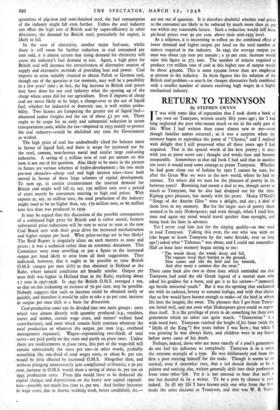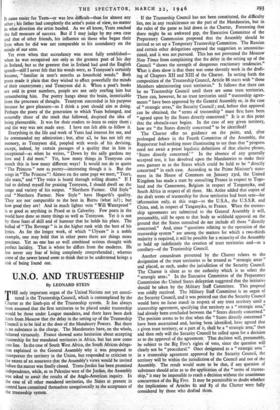RETURN TO TENNYSON
By STEPHEN GWYNN I T was with some idea of reparation that I took down a book of my own on Tennyson, written nearly fifty years ago ; for I had long neglected the poet who meant much to me in the early part of life. What I had written then came almost new to me—even though familiar names recurred ; so it was a surprise when my memory began to reproduce the poem of "Ulysses," and I realised with delight that I still possessed what all those years ago I had acquired. That is the special worth of the best poetry ; it stays with you as prose never can ; thought and words fuse and become acquired. That is the special worth of the best poetry ; it stays with you as prose never can ; thought and words fuse and become inseparable. Somewhere in that old book I had said that in another ten years it would need some courage to praise Tennyson. Whether he had gone clean out of fashion by 1910 I cannot be sure, but after the Great War we were in the new world, where he had no
contact. Yet where did we turn for the pleasure of poetry in the between years? Browning had meant a deal to me, though never so
much as Tennyson, but he also had dropped out for the time. Kipling gave pleasure, but mostly with his prose. Moira O'Neill's " Songs of the Antrim Glen " were a delight, and are ; a deal of them lives in my memory. But for the larger uses of poetry there seemed to be only Shakespeare; and even though, when I read him, time and again my mind would travel quicker than eyesight, and bring back the lines in advance.
Yet I never read him just for the singing quality—as one used
to read Tennyson. Talking this over, the one who was with me (she began to know Tennyson by the same fireside, ever so long
ago!) asked what " Tithonus " was about, and I could not remember. Half an hour later memory began saying to me: " The woods decay, the woods decay and fall, The vapours weep their burden to the ground, Man comes and tills the field and lies beneath, And after many a summer dies the swan."
There came back also two or three lines which reminded me that Tennyson had used the old Greek legend of a mortal man who asked his goddess for a boon, and got it to his sorrow—" immortal age beside immortal youth." But it was the opening that enchanted me with its cadence, breezy as autumn leafage, and with that choice that so few would have known enough to make—of the bird in whom life lasts the longest, the swan. The pleasure that I got from Tenny- son lasted well, and not even what Shakespeare gives could so repro-
duce itself. It is the privilege of poets to do something for their own generation which no other can quite match. " Generation" is a wide word here. Tennyson reached the height of his fame (with the " Idylls of the King") five years before I was born ; but while I was growing he was always there, and children were in my house
before news came of his death.
Perhaps, indeed, those who are more exactly of a poet's generation
do not feel his influence so completely. Tennyson is in a sense the extreme example of a type. He was deliberately and from the first a poet training himself for the trade. Though it seems to us normal, even if somewhat rare, that a lad should decide to be a painter and nothing else, writers generally drift into their profession from some other 'job. Yet it is not unusual to hear that such a one has decided to be a writer. To be a poet by chance is rare indeed. In all my life I have known only one who from the- first made the same decision as Tennyson, and that was W. B. Yeats. It came easier for Yeats—or was less difficult—than for almost any other ; his father had completely the artist's point of view, no matter in what direction the artist headed. As we all know, Yeats reached the full measure of success. But if I may judge by my own case and that of other friends, his influence on those who began their lives when he did was not comparable to his ascendancy on the minds of our sons.
Yet even when that ascendancy was most fully established— when he was recognised not only as the greatest poet of his day in Ireland, but as the greatest that in Ireland had used the English speech—still I never felt that his words were, as Tennyson's certainly became, "familiar in men's mouths as household words." Both poets made it plain that they wished to affect powerfully the minds of their countrymen ; and Tennyson did it. When a poet's books are sold in great numbers, people are not only reading him but remembering him. For poetry hangs about the brain, inextricable from the processes of thought. Tennyson succeeded in his purpose because he gave pleasure—as I think a poet should aim at doing. Perhaps the poets of the generation to which Yeats belonged, and assuredly those of the stock that followed, despised the idea of being pleasurable. It was for their readers to learn to enjoy them ; and the way was not made easy. I have not felt able to follow it.
Everything in the life and work of Yeats had interest for me, and he commanded my admiration ; but, after all, he has not left my memory, as Tennyson did, peopled with words of his devising, except, indeed, by certain passages of a quality that in him is exceptional—as when he writes, " Down by the sally gardens my love and I did meet." Yet, how many things in Tennyson can match this in how many different ways! It would not do to quote " The Princess " now as poetry—interesting though it is. But the songs in "The Princess"! Almost on the same page we meet," Tears, idle tears," and "Thy voice is heard through rolling drums." If I had to defend myself for praising Tennyson, I should dwell on the range and variety of his output. " Northern Farmer. Old Style " and " Northern Farmer. New Style " have Hogarth's quality. They are not comparable to the best in Burns (what is?) ; but how good they are! And in much lighter vein " Will Waterproof " is as good as anything in Praed or in Calverley. Few poets in the world have done so many things so well as Tennyson. Yet it is not by these feats of skill and of humour that he holds his place. The ballad of " The Revenge " is in the higher rank with the best of his lyrics. As for the longer work, of which " Ulysses " is a noble example, one may hold that in other poets there are things more precious. Yet no one has so well combined serious thought with perfect lucidity. That is where he differs from the moderns. He has never any fear of being completely comprehended ; whereas some of the newer brand seem to think that to be understood brings a risk of being found out.































 Previous page
Previous page